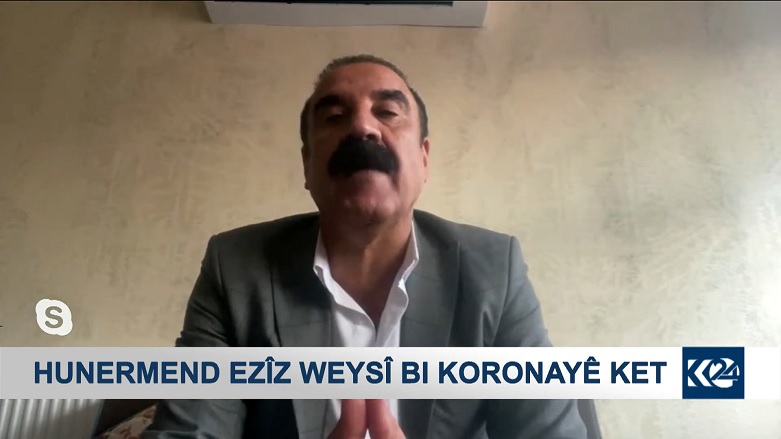After catching COVID-19, famed Kurdish singer calls on public to follow health guidelines

ERBIL (Kurdistan 24) – The famous Kurdish singer, Aziz Waisy, publicly revealed on Thursday that he had contracted the coronavirus disease. He strongly urged Kurds to follow health guidelines that limit the spread of the deadly virus, as the number of infections continues to increase globally.
Waisy’s comments came during a live interview with Kurdistan 24 from the Iranian Kurdish city of Kermanshah. A popular singer, Waisy is most well known for his lively music to which people perform Kurdish dances, called halparke, especially at events, like weddings.
“I became infected eight days ago,” he said, adding that he suspected he had caught the disease, after he began to experience symptoms associated with the virus, such as fever and body aches, including stomach pain and headache.
“Thankfully, my condition is better at the moment,” he explained, but he still experiences discomfort. “I have been self-quarantining for the past eight days,” he said, but “I will have to stay in for an additional six days.”
“If I go out and somebody else gets [the virus] from me, it would be awful,” he stated and further explained that when he was diagnosed, his family had been away, suggesting they may still be unaffected.
“I call on all the people of Kurdistan to adhere to the guidelines of medical professionals and experts,” Waisy said. His warning comes amid a surge in cases across the area, including in Iran, Iraq, and the Kurdistan Region.
Related Article: Kurdistan announces over 180 new COVID-19 infections, less than 10 fatalities
In June, another well-regarded Kurdish singer, Atta Chawshin, became infected with the virus. He passed away on June 22 at the age of 58 in the Kurdistan Region.
The emergence of the coronavirus has caused significant unemployment in Iran’s private sector. But the situation is likely even worse in Kurdish areas of the country, as well as other regions dominated by ethnic and religious minorities, where decades of economic neglect have stymied development.
The lack of development is also reflected in Iran’s health system. In a paper, written in April, for Washington DC’s Middle East Institute, and titled, “Covid-19: Hitting Iran’s minorities harder,” Ramin Jabbarli and Brenda Shaffer explained that minority areas, including Kurdish areas, suffered higher rates of coronavirus infections, because of the central government’s neglect.
Related Article: COVID-19 spikes again in Iran, with regional implications
Iran was the original epicenter of the virus in the Middle East, due to its close ties with China, where the virus first appeared in late 2019. The number of coronavirus infections in Iran spiked in late March, as authorities moved only slowly to enact measures to limit the spread of the disease.
Related Article: Iran finally shuts religious shrines, amid angry protest
Toward the end of April, daily cases dipped to under 1,000. However, as lockdown measures came to an end, a renewed increase in cases followed. Authorities now report an average of around 2,500 new patients a day.
The resurgence of the virus in Iran has coincided with a sharp increase in cases in neighboring Iraq and the Kurdistan Region, after they both resumed trade with Tehran in late May.
Related Article: WHO: 'Breach' of health regulations, trade with Iran behind new COVID-19 spike in Iraq, Kurdistan
On Friday, Iran’s federal health ministry reported that 154 more people had died due to coronavirus-related complications—a figure just under its record high on June 29. But even this maybe an undercount, as already in March, a local monitor in the Kurdish regions of Iran contested the official recording of coronavirus deaths.
According to Iranian government data, the country has suffered some 235,000 coronavirus cases, which include close to 196,000 recoveries and over 11,000 deaths. The nation ranks number nine among countries in the world in terms of coronavirus-related fatalities.
Edited by Laurie Mylroie
